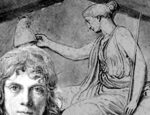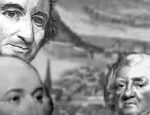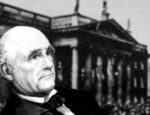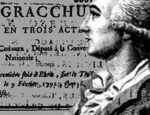Description
 Meet John Thelwall, political agitator and peripatetic speaker whose lectures on ancient Roman history were a disguise for commentary on contemporary politics in England and a call to radical reform. Son of a London silk merchant, he failed at several apprenticeships because he was always reading on the job. He became Literary Editor of the Biographical and Imperial Magazine and an ardent Jacobin, joined the London Corresponding Society, and fell in with the radical John Horne Tooke.
Meet John Thelwall, political agitator and peripatetic speaker whose lectures on ancient Roman history were a disguise for commentary on contemporary politics in England and a call to radical reform. Son of a London silk merchant, he failed at several apprenticeships because he was always reading on the job. He became Literary Editor of the Biographical and Imperial Magazine and an ardent Jacobin, joined the London Corresponding Society, and fell in with the radical John Horne Tooke.
In 1794 Thelwall was arrested along with Tooke and two others on a charge of sedition. He was eventually acquitted. But the infamous trial led to the passing of legislation making both the written and the spoken word liable to charges of treason, and forbidding the airing of political complaints in front of groups of more than fifty persons.
In response, Thelwall went on a tour to lecture on ‘Roman History’. But the lectures were actually based on a book by the Republican Walter Moyle, An Essay on the Constitution of the Roman Government, first published in 1726. This celebrated the more egalitarian parts of the Roman political system. Thelwall produced a new edition of Moyle’s book, under the provocative title Democracy Vindicated (1796). His lectures offered an even more radical view of the Roman Republic than had Moyle.
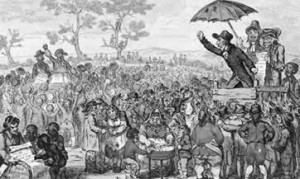 Thelwall even looked like a Roman Republican. At the time of the French revolution, rebels in both France and Britain threw away their wigs and powder and cropped their hair close to their heads. During the scandal surrounding the sensational trial, both supporters and enemies of the alleged traitors produced popular songs and broadsides. One poem sympathetic to Thelwall commented on his appearance: ‘Each Brutus, each Cato, were none of them fops/But all to a man wore republican crops.’ A new tax on hair powder introduced in 1795 meant that natural hair colour meant a man was either poor or sympathetic to the poor; informers even used the short and unpowdered hairstyle of a friend of Thelwall called Tom Poole, a Somerset tanner, as evidence of his revolutionary views.
Thelwall even looked like a Roman Republican. At the time of the French revolution, rebels in both France and Britain threw away their wigs and powder and cropped their hair close to their heads. During the scandal surrounding the sensational trial, both supporters and enemies of the alleged traitors produced popular songs and broadsides. One poem sympathetic to Thelwall commented on his appearance: ‘Each Brutus, each Cato, were none of them fops/But all to a man wore republican crops.’ A new tax on hair powder introduced in 1795 meant that natural hair colour meant a man was either poor or sympathetic to the poor; informers even used the short and unpowdered hairstyle of a friend of Thelwall called Tom Poole, a Somerset tanner, as evidence of his revolutionary views.


